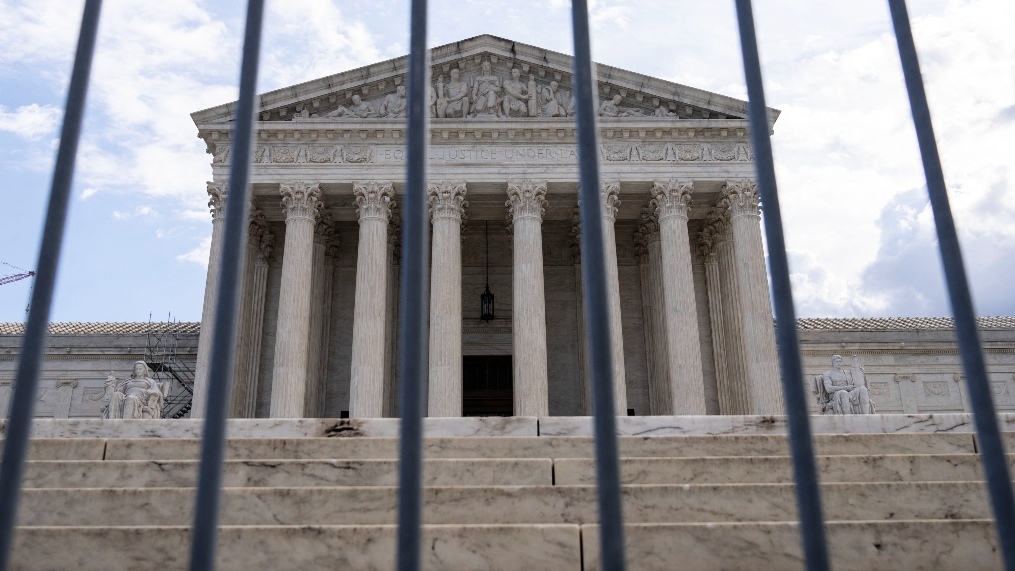US Supreme Court will not hear challenge to Arkansas anti-BDS law

The US Supreme Court on Tuesday declined to weigh in on a legal fight over an Arkansas law that requires contractors to sign a pledge not to boycott Israel.
The country's top court rejected a petition from the Arkansas Times, which was looking to challenge a lower court's ruling dismissing the newspaper's lawsuit which claimed the legislation violates the free speech protections guaranteed by the US Constitution.
The newspaper said the law was "abhorrent and a violation of the Bill of Rights".
"We are obviously disappointed at the news today from the US Supreme Court," the Arkansas Times said in a statement given to Middle East Eye.
"We are not boycotting Israel but neither do we sign political pledges in return for advertising. Especially state advertising."
Arkansas passed a law in 2017 that mandated all public agencies not to do business with contractors - in contracts worth at least $1,000 - unless they affirm that they will not boycott Israel.
The Arkansas Times, a small newspaper, challenged the legislation in 2018 when a state college refused to continue paying for advertisements on the paper until it signed the anti-boycott pledge.
The Arkansas law states that contractors with the state must reduce their fees by 20 percent if they don't sign the pledge.
After a federal appeals court ruled in June 2022 that the state was not infringing on constitutional free speech protections, the newspaper took the case to Supreme Court, which has now ultimately closed the case.
But the publisher of the Arkansas Times, Alan Leveritt, told MEE that while the decision is unfortunate because the court simply chose not to hear the case, it doesn't create a precedent for other states where similar legislation was struck down as unconstitutional.
"They did not rule the merits of the case, they just declined to hear it. So it has no impact on Georgia, Kansas, Texas, Arizona, all places that this law has been ruled unconstitutional. It's still unconstitutional. It's just not unconstitutional in Arkansas."
Leveritt also noted that the newspaper has been able to change its business model and is now "100 percent funded by readers and donors" who pay for online subscriptions, making the paper no longer reliant on advertisements.
Rise in anti-BDS laws
The Palestinian-led Boycott, Divestment and Sanctions (BDS) movement is a non-violent initiative that seeks to challenge Israel's occupation and abuses of Palestinian human rights through economic, cultural, and academic boycotts, similar to the successful boycott campaigns of apartheid South Africa.
Free speech and Palestinian advocacy groups have slammed the growing number of anti-BDS bills in state legislatures, accusing sponsors of legislation that tries to muzzle criticism of Israel at the expense of the US constitution.
More than 40 states have introduced some form of an anti-boycott bill in their state legislatures, according to a tally conducted by Palestine Legal, a legal and advocacy group based in the US. Multiple lawsuits have been filed in the US against such laws, to varying degrees of success.
In some of these states, the law was struck down by courts as unconstitutional. However, in states like Texas, Kansas, and Arizona, the law was amended to narrow the requirement so it applied only to larger contracts.
And while these anti-boycott bills only exist currently at the state level, Republican Senator Tom Cotton recently introduced a bill that would prevent the US military from contracting with any companies engaged in a boycott of Israel.
Middle East Eye delivers independent and unrivalled coverage and analysis of the Middle East, North Africa and beyond. To learn more about republishing this content and the associated fees, please fill out this form. More about MEE can be found here.





